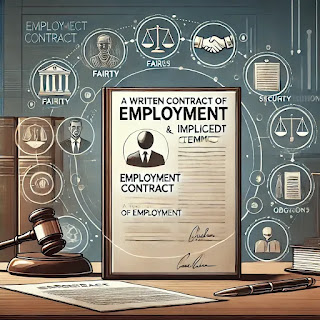Contracts – Implied Terms – Breach of Agreement – Employment Contract – Business Efficacy – Necessity – Custom – Written and Oral Agreements – Precedence of Written Contract.
Supreme Court of the Democratic Socialist Republic of Sri Lanka
Case Title: D. A. J. Ranwala v. Ceywater Consultants (Pvt) Ltd.
Citation: SC Appeal No. 19/2017
Judges: Hon. P. Padman Surasena, J; Hon. Janak De Silva, J; Hon. Arjuna Obeyesekere, J
Date of Judgment: 8th August 2024
Headnote [by the Gallelawblogger]
Contracts – Implied Terms
– Breach of Agreement – Employment Contract – Business Efficacy – Necessity –
Custom – Written and Oral Agreements – Precedence of Written Contract.
In an appeal concerning an
employment contract, the Supreme Court examined whether an implied term could
be enforced against the express terms of a written contract. The case revolved
around the alleged breach of an agreement to employ the Plaintiff-Appellant-Respondent
(Respondent) for the full duration of a project. The Court scrutinized the
terms of the written contract and the circumstances under which implied terms
may be incorporated.
Background:
The Respondent, a
Chartered Civil Engineer/Hydrologist with over 23 years of experience,
initiated an action against the Defendant-Respondent-Appellant (Appellant)
claiming Rs. 2,500,000/- as damages for breach of an agreement. The dispute
arose from the "Lunawa Environmental Improvement and Community Development
Project," for which the Appellant was selected as the consultant. The
Respondent alleged that he was promised employment for the full duration of the
project, encompassing both the Design and Construction Phases.
Facts:
The Appellant invited the
Respondent to submit his Curriculum Vitae, promising employment as a Design
Engineer for the project.
The Respondent received a
letter of appointment for the Design Phase effective from 01.10.2003, with
subsequent extensions.
The Respondent claimed
that he was waiting to be called for the Construction Phase but was not,
allegedly violating the terms of the agreement.
Legal Issues:
1. Whether the High Court erred in
upholding the contention that the Respondent proved that the Appellant
dishonoured the promise of employing the Respondent in the 2nd Stage
of the project.
2. Whether the High Court erred in
holding that the Appellant had not upheld the promise of employing the
Respondent as per document marked "P9".
3. The applicability of implied terms in
the context of the express terms of the written contract.
4. The precedence of written contract
terms over alleged implied terms.
Precedents Discussed:
Duke of Westminster andOthers v. Guild (1985) Q.B. 688 at 700: Discussed the conditions under which
terms can be implied into a contract to give it business efficacy or out of
necessity.
Johnstone v. Bloomsbury
H.A. (1992) 1 Q.B. 333: Addressed the need for implied terms to be consistent
with the express terms of the contract.
Weeramantry, Law of
Contracts: Emphasized that contracts may be express or implied, and the
intention of the parties must be determined objectively.
Chitty on Contracts,
General Principles: Stated that an agreement may be partly oral and partly
written, but written terms take precedence over implied terms.
Conclusion:
The Supreme Court held
that the written contract between the parties, dated 22.09.2003, clearly
specified the terms of the Respondent's employment. The contract included
provisions for termination and did not guarantee employment for the full
duration of the project. The Court found that the "Schedule V for
Professional Personnel" (P9) did not form part of the agreement, as it was
not shown to the Respondent before entering into the contract.
The Court concluded that
while certain terms can be implied to give effect to the parties' intentions,
such terms must not be inconsistent with the express terms of the contract.
Since the written contract negated the alleged implied agreement to employ the
Respondent for the full term of the project, the written terms prevailed.
The Supreme Court answered
the two questions of law in the affirmative, set aside the judgment of the High
Court, and affirmed the judgment of the District Court. The Appellant was
entitled to costs in both the High Court and the Supreme Court.
Appeal allowed with costs.
READ JUDGMENT EFFORTLESSLY - CLICK




Comments
Post a Comment